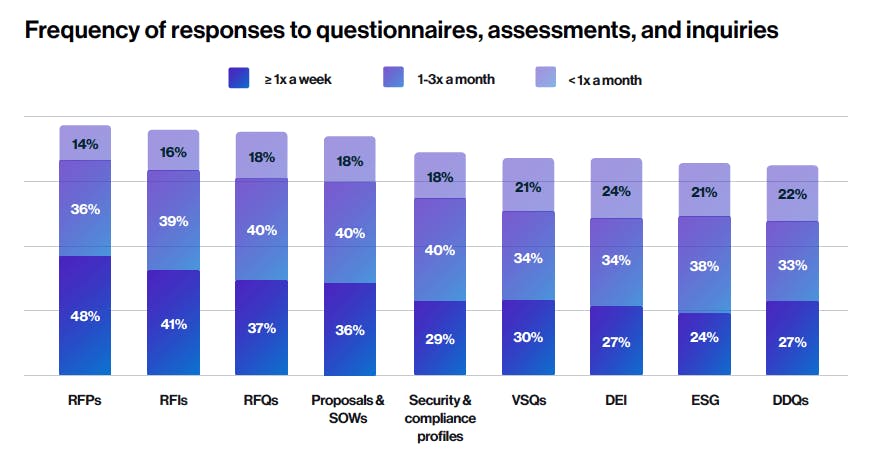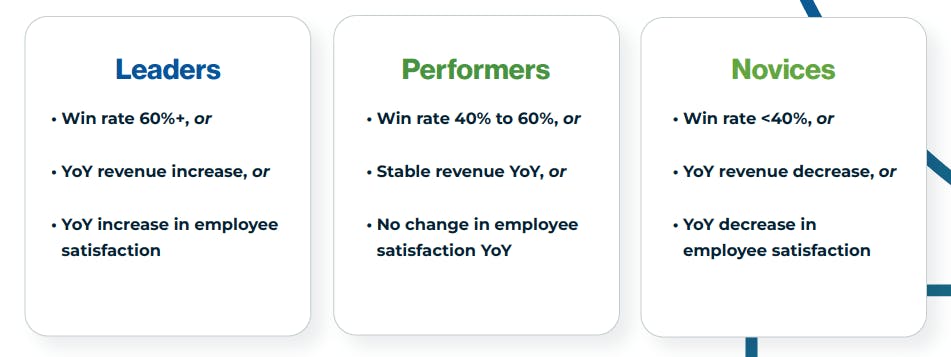What is Strategic Response Management (SRM)?
It’s never been harder to win. B2B buyers today have tighter budgets, more solutions to consider, more information to parse, and tighter deadlines.
To differentiate and win in this hypercompetitive environment, organizations have to not only address these increasing demands quicker, more accurately, and more persuasively, but do so while mitigating the risk of sharing company knowledge externally.
With such an increasing demand placed on the bid, proposal, and revenue teams managing these complex processes and information, leading organizations are prioritizing Strategic Response Management (SRM) to gain an outsized competitive advantage.
Recent research published in The 2024 State of Strategic Response Management Report – a collective effort between Responsive and the Association of Proposal Management Professionals (APMP) that surveyed more than 750 sales, proposal, and IT executives and practitioners – suggests that adopting SRM is mission-critical: those organizations that consider SRM a top priority are seeing higher win rates, more revenue, and greater employee satisfaction.
The report also outlines what these leading organizations are doing to stay ahead of buyer trends while harnessing the power of AI to deliver compelling responses and win more business.
Using these trends and benchmarks, let’s take a closer look at what SRM actually is and why an AI-powered SRM platform is a must-have go-to-market (GTM) solution for all B2B organizations.
Strategic Response Management (SRM): Definition
Strategic Response Management (SRM) is the people, practices, and technology that unlock organizational knowledge for profitable growth.
In practice, SRM allows revenue teams (including bid and proposal teams) to respond to complex information requests quickly and accurately by democratizing information across the organization. Using an AI-driven SRM platform, organizations can create a single source of truth for their most compelling, current, and customer-facing information — one that powers all types of information exchange across an opportunity lifecycle, from RFXs and security questionnaires to one-off answers to ad hoc questions.
Thanks to this greater access to accurate information across the organization, SRM revs up an organization’s revenue engine through:
- A democratized single source of truth that transforms how information is shared
- Greater intelligence, better collaboration, efficiency, and trust
- Improved scalability so organizations can stay ahead of upcoming trends
- An AI toolset that helps revenue-generating teams move significantly faster, among a slate of other benefits
Companies that have already adopted an AI-powered SRM solution are seeing greater wins, driven by more efficient and effective response and proposal processes.
Companies that understand the importance of this mission-critical function and invest accordingly will pull ahead, winning more deals and greater revenue while improving operational efficiency and employee satisfaction across the board.Rick Harris, Chief Executive Officer, APMP
Traditional proposal management approaches are unsustainable
The emergence of SRM as a cornerstone capability for any organization that seeks scalable, profitable, and consistent revenue growth is directly tied to recent trends that have elevated the importance and impact of bid and proposal teams.
Most organizations have dedicated bid and proposal teams, and according to The 2024 State of Strategic Response Management Report, 90% say that these teams are a direct and significant contributor to revenue.
However, as organizations field more questionnaires, assessments, and inquiries, bid and proposal teams have become significantly more strained in overseeing responses, a number of significant challenges have surfaced impeding their ability to match the growing demand.
Far more than RFPs
Nearly 50% of organizations surveyed said they respond to lengthy RFPs at least once a week. RFIs ranked second highest at 41%, and more than a quarter of organizations also respond to DDQs weekly.

77% report an increase in work volume associated with bids, assessments, and questionnaires. However, the increase in volume and complexity is far from the only challenge these teams face.
The most significant challenges proposal teams face (according to all survey respondents) include:
- Too few resources to effectively handle the volume of requests (50%)
- Tight deadlines (48%)
- Difficulty getting input from multiple subject matter experts (SMEs) (48%)
- Overwhelming volume of siloed and scattered information (46%)
- Difficulty in identifying the right requirements and/or contributors (41%)
Finding a better solution
Despite driving revenue, ROI, and compliance, bid and proposal teams are often left out of shaping GTM strategy, and their accomplishments often don’t make the shortlist when assessing company-wide impact. It doesn’t help that fewer than half of respondents are tracking these metrics.
However, the 2024 State of SRM Report revealed that companies with the highest win rates were 20% more likely to have their strategic response teams contribute to and help shape the company’s go-to-market (GTM) strategy (85% vs. 65%).
With such a clear impact on driving growth and results, organizations need to break down the old siloed approach of developing a GTM strategy and involve these teams as they are crucial in influencing win rates and revenue.Sodexo did exactly that by elevating its bid and proposal team to a strategic response team that aligns cross-functional stakeholders, processes, and systems for greater success. This transformed the proposal team into a growth engine.
We’ve changed perceptions and up-leveled the function to operate at a higher level and get a bigger seat at the table by leveraging performance data to demonstrate our direct impact on revenue.Danelle Morrow, CF. APMP, VP North America Proposal Development Center, Sodexo
Strategic response teams are stewards of capital. They identify the right opportunities to pursue and create the responses and proposals that lead to both increased wins and revenue. Adopting a Strategic Response Management positioning requires recognizing the importance that traditional bid and proposal teams play in revenue generation and breaking down silos.
Morrow said the Sodexo team continues to deliver ROI through a steady, double-digit increase in win rates, doubling stakeholder CSAT scores, and more mega deals won than any prior year.
“It’s time to recognize proposal teams for their vital role in making the revenue engine hum,” Morrow said.
Strategic Response Management vs. traditional proposal management
We’ve seen the benefits of an effective SRM approach, but how does it compare to the traditional approach to proposal management? To put it simply, the traditional response management process is siloed, inefficient, and too often ad hoc.
Information comes into an organization quickly and needs to be disseminated across multiple channels just as quickly. The traditional process can no longer keep pace with the speed at which business moves today — and is certainly no match to what organizations can accomplish with an AI-driven SRM platform that can quickly shred RFXs, empower field teams to find the best answers through self-service, generate on-brand proposals in a fraction of the time, and more.
SRM solutions can also use an AI engine to drive smart content recommendations and responses, help create intelligent workflows, and even recommend the best collaborators for each project.
As a result, organizations that have already adopted SRM have seen higher win rates, increased productivity, efficient scalability, and higher morale across the organization.
As organizations cope with increasing buyer demands, those that are investing in SRM and AI-powered SRM platforms are outperforming their peers. The next generation of market leaders will use AI across the pursuit lifecycle to guide go/no-go decisions, enable intelligent workflows, and develop compelling responses.Ganesh Shankar, Co-founder and CEO, Responsive
Companies investing in SRM outperform their competitors
As the volume, length, and complexity of RFPs and other assessments continue to rise, so too does their importance in revenue generation.
The 2024 State of Strategic Response Management Report found that RFPs and other strategic responses influence, on average, 48% of company revenue generation, with 70% of organizations saying the revenue generated from these responses has increased in the past year alone.
With such importance placed on revenue generated from responses, organizations now have a simple choice: be crushed by the increased demand or crush their strategic responses by driving optimal SRM across the organization.
Data in the report showed that organizations that embraced the idea of SRM and harnessed the power of AI win more deals, generate more revenue, and have greater employee satisfaction. The research categorized organizations as follows:

The Leaders in the report were organizations with a win rate of 60% or higher, a YoY revenue increase, or a YoY increase in employee satisfaction. To achieve these results, these companies:
- Recognize strategic response teams as high-impact players
- Invest in resources to help grow these teams
- Design scalable processes that unify their teams
As we outlined earlier, an effective SRM strategy involves elevating strategic response teams, investing more resources into those teams, and designing scalable processes to help bring teams together across the organization. It should come as no surprise then that leading organizations have addressed all three areas and are thus seeing the most significant momentum in win rates, revenue, and employee satisfaction.
How one of the world’s largest companies embraces SRM with incredible results
Before partnering with Responsive, Microsoft realized that their response solution didn’t meet their needs. The search functionality was clunky, there was no project automation, and their solution wasn’t scalable.
Additionally, Microsoft wanted their company knowledge to be accessible to everyone who needed it across the organization — not just RFP response personnel.
After just 18 months of using Responsive, more than 7,000 Microsoft users accessed the platform to find 36,200 ready-to-go RFx responses from their Responsive Content Library. With a conservative estimate of 20 minutes saved per response, Microsoft estimated $2.4M in savings during the first 18 months.
After three years, Microsoft accumulated more than 13,000 Responsive users who regularly search a Content Library of more than 18,000 Q&A pairs across nine collections. In 2022 alone, Microsoft estimates that its savings nearly doubled compared to those first 18 months.
Hear more below from Carrie Jordan, Director of Proposals serving Microsoft’s Proposal Center of Excellence:
How can SRM impact smaller organizations?
Microsoft is one of the largest organizations in the world, but how can a comprehensive SRM strategy help a smaller organization make the best use of their time and remain competitive with larger organizations?
Stibo Systems is a leader in master data management headquartered in Denmark. They receive more than 150 lengthy RFPs, RFIs, RFQs, security questionnaires, and other information requests every year. Compliance is mandatory and consistency is a competitive necessity.
Before adopting Responsive as their AI-powered SRM platform, Stibo Systems faced numerous challenges:
- Revenue was at risk due to out-of-date information in responses and proposals.
- Former proposal software had an unfixable production issue that disrupted the Global Bid Desk’s workflow.
- Users did not trust the former software. Content was difficult to find and update, collaboration occurred outside the tool, and it never performed as promised.
- Lack of a Salesforce integration made it difficult to implement repeatable response processes, resulting in time wasted on unqualified opportunities.
Since partnering with Responsive, Stibo Systems’ strategic response teams have seen transformative results, saving dozens of hours for the Global Bid Desk team on every project by automating workflows, instantly surfacing relevant content, and simplifying content contribution processes for their SMEs.
When you use something like Responsive and the services of a bid management team, like my team, you reduce risk and you save multiple teams multiple hours per project, and you increase your win rate.Beth Bissel, Global Bid Management – Team Lead, Stibo Systems
Hear more from Beth below:
Final thoughts on Strategic Response Management (SRM)
As the needs of B2B buyers are increasing, leading companies are turning to Strategic Response Management (SRM) to stay ahead while harnessing the power of AI to deliver winning responses and bank more revenue, faster.
Organizations like Sodexo, Microsoft, and Stibo Systems recognize the strength of SRM to stay ahead. They see their strategic response teams as high-impact players, invest in those teams to help them grow, and design scalable processes that unify teams cross-functionally.
It’s these organizations, and those like them, that will continue to come out on top with higher win rates, increased revenue, and increased employee satisfaction in the years to come.
Interested in reading more? Access the full 2024 State of Strategic Response Management (SRM) Report to see all the data that will undoubtedly prove essential in shaping your winning SRM strategy.

